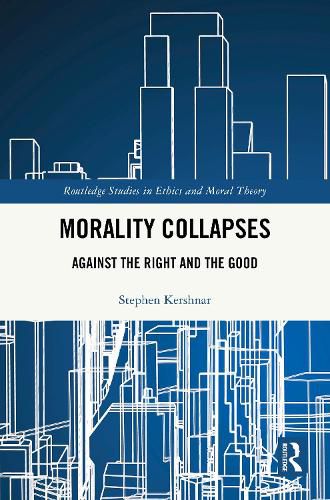Readings Newsletter
Become a Readings Member to make your shopping experience even easier.
Sign in or sign up for free!
You’re not far away from qualifying for FREE standard shipping within Australia
You’ve qualified for FREE standard shipping within Australia
The cart is loading…






This book argues that consequentialism and non-consequentialism are false because they face metaphysical and intuitional problems. The two theories exhaust the theories of the right, so there is no rightness.
This result matters because it requires us to give up widely held beliefs regarding knowledge, moral responsibility, and reasons for action. The author's argument is unique because it focuses on applied-ethical arguments rather than metaethical issues. Specifically, it avoids metaethical discussions of whether morality explains our thoughts and actions, how we know about morality, and whether the denial of morality is self-defeating. The author specifically argues against consequentialism and non-consequentialism in the following ways:
Metaphysical Problems: Consequentialism and non-consequentialism are false because they need a theory of counterfactuals and backtracking that they cannot have Rights Problems: Non-consequentialism is false because non-consequentialism depends on rights, and people do not have rights. They do not have rights because of problems regarding moral responsibility, right-grounding, and self-ownership Circularity: Non-consequentialism is false because the basic building blocks of non-consequentialism-desert, rights, and virtue-are circular
Morality Collapses will be of interest to researchers and graduate students working in normative ethics, metaethics, moral responsibility, and political philosophy.
$9.00 standard shipping within Australia
FREE standard shipping within Australia for orders over $100.00
Express & International shipping calculated at checkout
This book argues that consequentialism and non-consequentialism are false because they face metaphysical and intuitional problems. The two theories exhaust the theories of the right, so there is no rightness.
This result matters because it requires us to give up widely held beliefs regarding knowledge, moral responsibility, and reasons for action. The author's argument is unique because it focuses on applied-ethical arguments rather than metaethical issues. Specifically, it avoids metaethical discussions of whether morality explains our thoughts and actions, how we know about morality, and whether the denial of morality is self-defeating. The author specifically argues against consequentialism and non-consequentialism in the following ways:
Metaphysical Problems: Consequentialism and non-consequentialism are false because they need a theory of counterfactuals and backtracking that they cannot have Rights Problems: Non-consequentialism is false because non-consequentialism depends on rights, and people do not have rights. They do not have rights because of problems regarding moral responsibility, right-grounding, and self-ownership Circularity: Non-consequentialism is false because the basic building blocks of non-consequentialism-desert, rights, and virtue-are circular
Morality Collapses will be of interest to researchers and graduate students working in normative ethics, metaethics, moral responsibility, and political philosophy.